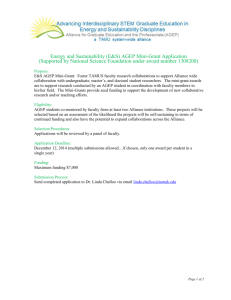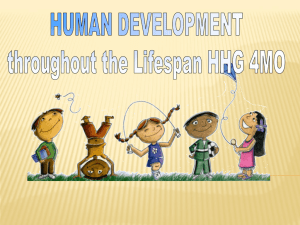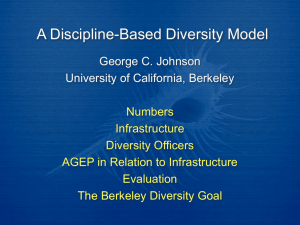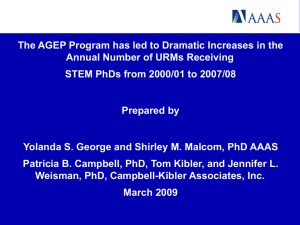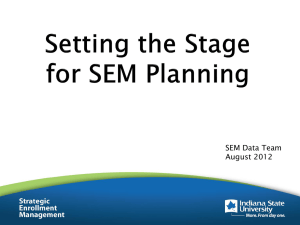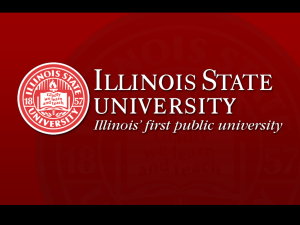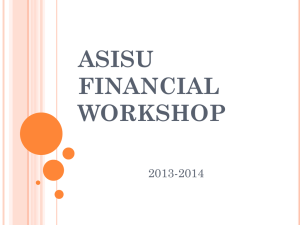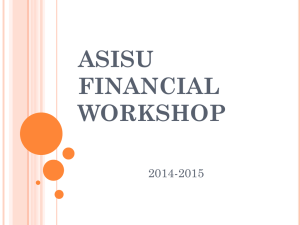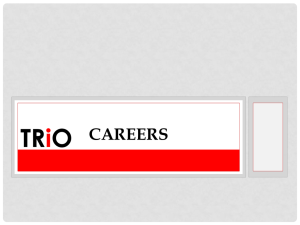AGEP IOWA: an alliance of University of Iowa, Iowa - NSF-AGEP
advertisement
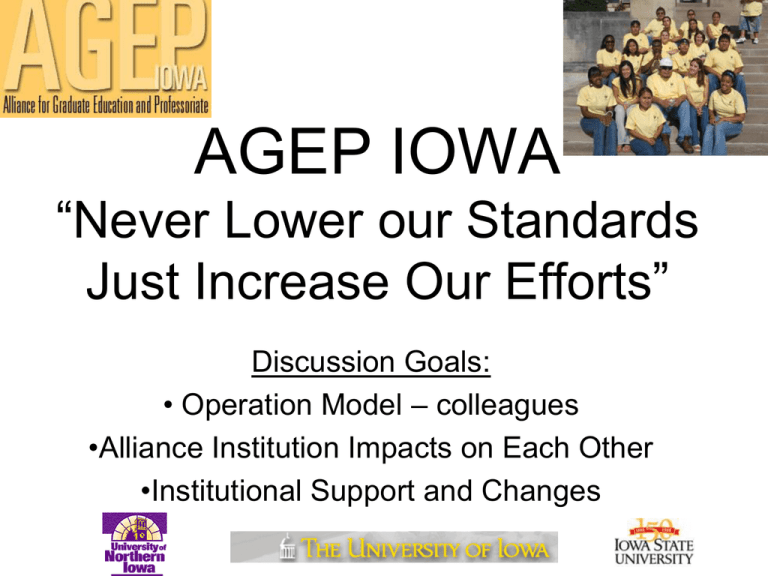
AGEP IOWA “Never Lower our Standards Just Increase Our Efforts” Discussion Goals: • Operation Model – colleagues •Alliance Institution Impacts on Each Other •Institutional Support and Changes UI Department of Mathematics Serves as the MODEL • Started with a handful of faculty • Worked to change the department culture 25% 20% 15% 10% 5% 05 20 03 20 01 20 99 19 97 19 95 19 93 0% 19 % Minority Grad Students in Math at UI 30% – Define talent – Atmosphere of support – Identify and solve barriers AGEP Impact – U of Iowa 80 70 Students 60 50 Ph.D. Enrollment 40 Chemistry 30 Engineering 20 Mathematics 10 Pharmacy 0 STEM in GMAP Increases (ISU) (GMAP is Grad College internal funding) 80 Number of GMAP Students OTHER 70 STEM 60 50 40 30 AGEP 20 10 0 97 98 99 00 01 02 03 Fiscal Year 04 05 06 07 08 Underlying Philosophy (faculty driven) • Students – Identify talented students: be honest about skills and never overlook talent – Mentor students to develop their skills • Departmental Focus – Work with departments to assist their faculty in creating a culture that will broaden participation • Institution – Partner with minority-serving institutions to identify and mentor students – Support faculty in these efforts • “Never lower our standards, just Increase our efforts” Culture in an AGEP Department • Faculty driven evaluation of prospects – Broaden definition of talent – Work with prospective student’s mentors • Student success is paramount – Look at ways to make a student successful – Remove barriers designed to see how high a student can jump • Whole department mentors students • All graduate students benefit Statistics Dept. at ISU – Partnered with UI Math (Started AGEP in ’02) • 2-6 URMS admitted each year – Faculty actively recruit • Students progressing through PhD program – Passing MS exam, PhD qualifier Exams • Ombudspersons appointed by chair (paid assistantship) – Help sessions and office hours for first year students • Assistantships without full teaching schedule – Focus on course work during 1st year – Senior student mentor others • Introduced “Measurement Theory Course” (1cr.) – Focused on typical deficiency • Junior faculty are involved Math at ISU • Faculty appointed to lead department diversity efforts – given course release • • • • Mentoring program implemented Faculty visiting and presenting at HBCU’s Lead diversity efforts at national math institute Building research/teaching/professional partnerships with UPR-M, Spelman, FAMU, … How a New Department Participates (ME at ISU) • Commitment of 3 to 5 faculty to do work • Partner with Successful departments to learn – Learn from our colleagues – Transfer/develop best practices • Participate in trips to HBCU, TCU, and HACU – Meet faculty and build research ties • Use AGEP network to find faculty candidates Alliance Institutions Impact Each other • UNI Mathematics (MS program) – Reviewed and updated Pure Math curriculum • Align with national norms • Prepare students for UI and ISU PhD qualifier • ISU AGEP Program – Moved from staff to faculty lead – ISU faculty council developed based on work with Phil Kutzko at UI • All three provosts commit to support AGEP while waiting for competition to start again – Permanent agenda item on 10 meetings per year Growing Faculty Led Collaborations • Discipline driven Example – Math Alliance (current) --> Quantitative Sciences • ~$70,000 from Alliance colleges and departments for conference • Nov 8th 50-60 URM student along with faculty mentors in Iowa • University Wide faculty network – FIRES • (Faculty Initiatives to Recruit and Retain Excellence in STEM) • Share best practices and develop teams for funding opportunities • Focused on partnerships with minority-serving institutions – Mentor based – Research based collaborations (funded) Example Research Partnerships • Exploratory Trips – couple with grad or intern fair – University of Arkansas Pine Bluff, Prairie View A&M University, Spelman, Morehouse, Clark Atlanta, Jackson State, FAMU, Bethune-Cookman – Meet with Administration and faculty • Identify and ask for administration support • Identify specific faculty interested in developing collaborations • Initiate 3/2 engineering program development • Follow-up – Recruit ISU, UI, and UNI faculty – Trip to school or trip to Iowa (Bio-Economy Institute) • Lessons: – – – – New faculty are research active looking for partnerships Deans support collaborations – even with funding 2-way partnerships are required – we can support Curriculum collaborations also possible Fellowship Funding Model Matters (Assistantships) • Current Model – Central funds used for about 50% for up to 5 years • Previous model – Full central funding first 2 years Faculty/Departments commit at beginning Faculty/Departments can wait to see if a student survives before committing their time. Institution Support • • • • Provosts – Wallace Loh (UI), Betsy Hoffman (UNI), James Lubker (UNI) Graduate Deans – John Keller (UI), David Holger (ISU), Sue Joseph (UNI) Collegiate Deans & Department Chairs Types of support provided by upper administration – – – – – – – Meet with AGEP faculty AGEP on COP agenda Memos to collegiate deans and department chairs supporting AGEP faculty members Full support to Faculty Council Chair Leads provost leadership discussions of resources Providing financial support to faculty led efforts Modifying PRS to give credit • TOTAL Financial Support during the grant period – – – UI: $1.67M (5 yrs) ISU: $1.51M (5 yrs) UNI: $0.23M (5 yrs) + continuing support during no-cost extension UI – 2 new fellowships per year ISU – expect 5 new AGEP Fellows UNI – continue grad college fellowships Joint recruiting efforts Never lower our standards, just increase our efforts • GOAL – At least 10% of the graduate students in STEM fields from underrepresented minority groups – Ph.D. graduation rate and job placement comparable to domestic majority students • Placement into tenure-track positions at research intensive universities HOW CAN THE AGEP FACULTY COUNCIL TEAM WITH YOU TO CREATE CHANGE?
